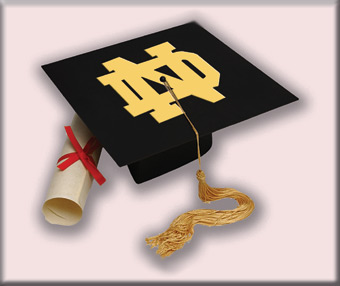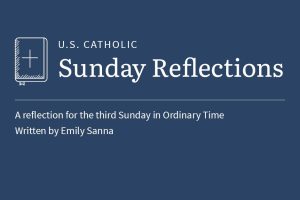Catholics shouldn't let single-issue politics deprive us of our hard-won place at the heart of America's democracy.
Ah, spring. A warming sun melts the winter freeze, while the proverbial April showers give way to May's commencement speaker "scandal" at the local Catholic college, splashed across the morning news.
May's media bouquet comes courtesy of the Cardinal Newman Society, whose annual report catalogs which Catholic universities invited "scandalous commencement speakers and honorees" to their commencements. Targeting primarily Catholic schools that have hosted pro-choice politicians, the society trained its sights this spring on President Barack Obama's invitation to the inner sanctum of Catholic higher education, the University of Notre Dame.
The Newman Society wasn't alone. Scores of Catholic bishops-42 at press time-and other individuals lined up to object to the president's address and the honorary degree Notre Dame offered. Notre Dame's home bishop, John D'Arcy of the Diocese of Fort Wayne-South Bend, Indiana, announced he would not attend the commencement, and a coalition of student and alumni groups readied protests.
Notre Dame-which has conferred honorary degrees on eight presidents, with five giving the commencement address-resisted the pressure. "You cannot change the world if you shun the people you want to persuade," asserted ND President Father John Jenkins in response to calls for his resignation. Jenkins found support among other Catholic institutions of higher education, but the controversy reopened the barely healed wounds of last November's election, in which Catholics lined up to explain why it was either entirely acceptable or absolutely impossible to vote for a pro-choice Democrat.
On some level, of course, the controversy is about the privileged place abortion occupies in Catholic political discussion. But lost in the hubbub is the question of just who applies the "Catholic enough" test to a speaker. Self-appointed arbiters-including the privately-funded Newman Society and groups like it, none of which enjoy official ecclesiastical standing-demand a strict litmus test on issues such as abortion, same-sex marriage, even women's ordination.
In effect such efforts not only profoundly shorten the list of "Catholic issues," they unnecessarily constrain the conversations that can occur at Catholic institutions. Such narrow boundaries threaten to leave Catholics shouting from the fringes of the public debate rather than hosting the discussion-hardly the way to promote your cause in a democracy.
What makes the Notre Dame situation all the more ironic is that American Catholics spent much of the last century working to throw off anti-Catholic bias and win a place in American public life. For better and for worse they succeeded, electing a Catholic president in 1960. Catholics of both political parties now occupy the offices of the vice president and speaker of the House of Representatives, five seats on the U.S. Supreme Court, and about 30 percent of congressional seats. How their Catholicism affects their politics is and will continue to be open to vigorous debate, though no politician or jurist is ever likely to achieve Catholic perfection by any measure.
It's true that our Catholic engagement with American democracy has not always produced public policies in line with the high bar of Catholic teaching-and likely never will. But now is not the time to withdraw once again into a political ghetto, consigning the riches of Catholic tradition to the margins of our democracy.
Despite real differences on important matters, a president who cut his political teeth organizing communities in Chicago's poor urban Roman Catholic parishes certainly has a place on the rostrum at Notre Dame. And it's entirely appropriate to acknowledge-even honor-those things about him we find admirable while challenging him to think more deeply about the issues over which we disagree.
But even more, Obama's presence at Notre Dame is another sign of the political maturity of American Catholicism as a powerful presence for the good of all our fellow citizens. Our place in the public square, hard won by those who have preceded us, is not one we should abandon.
This article appeared in the June 2009 issue of U.S. Catholic (Vol. 74, No. 6, page 8).
Image: Tom Wright













Add comment